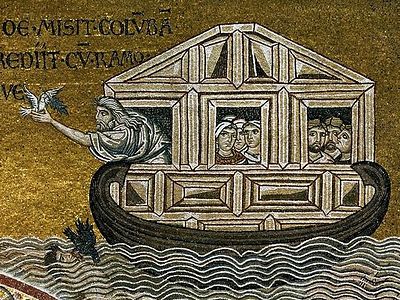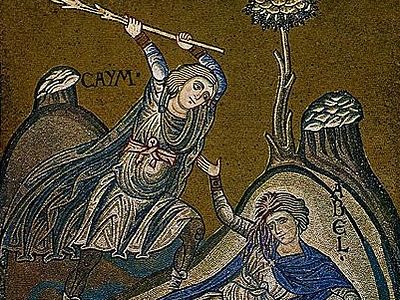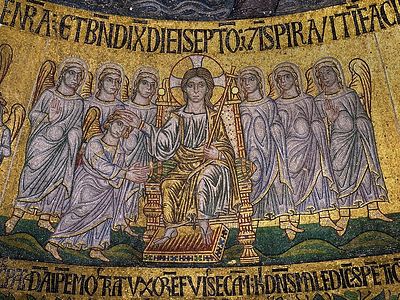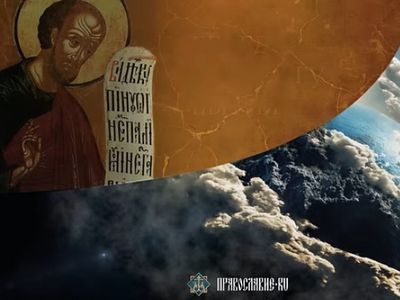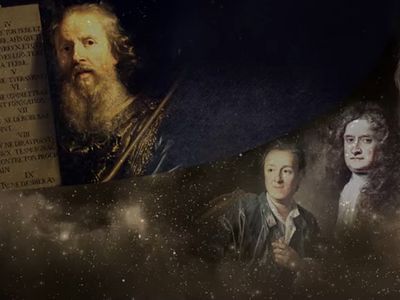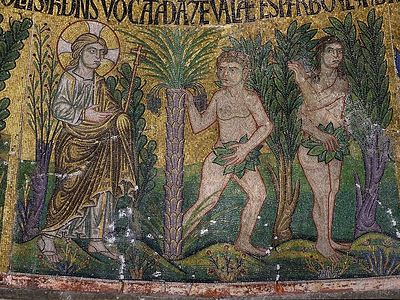Part 6. The Cause of Destruction of the Antediluvian Civilization
Is nationality important for a Christian, or should he not be concerned about his people? Why was Ham’s son Canaan cursed for Ham’s sin? How is the sin of Ham1 manifested in us? We continue to read the book of Genesis with historian and specialist on sects Andrei Ivanovich Solodkov.
Sin. The death of the soul?
God cleansed the earth from sin by the waters of the flood. Noah left the ark, built an altar to God and served a moleben of thanksgiving. And his sons with him left the ark—Shem, Ham, and Japheth.
We read in chapter 9 of Genesis:
And God blessed Noah and his sons, and said unto them, Be fruitful, and multiply, and replenish the earth… Every moving thing that liveth shall be meat for you; even as the green herb have I given you all things (Gen. 9:1, 3).
Venerable Ephraim the Syrian writes: “[God] also blessed Noah and his sons that they might be fruitful and multiply and that fear of them should fall upon all flesh both in the sea and on dry land. Only you shall not eat flesh with its life, that, you shall eat no flesh that has not been slaughtered and whose blood, which is its life,2 has not been drained.”3 God concludes a covenant with Noah and recalls the commandment to bear children and to spread people across the whole of the face of the earth. In the next lecture, on the Tower of Babel, we will see how this commandment will be broken. It is violated to this day.
We spoke about the soul of animals being contained in their blood in the second talk in our cycle, when we looked at the question of the creation of the soul of man and raised the question of the mistaken understanding of Biblical texts by the Jehovah’s Witnesses sect. This sect’s prohibition against blood transfusions, from which many, including children members of the sect, in need of this emergency operation have died, is based on this misconception. Let me remind you that in Hebrew there are three words with the meaning, “soul”: “nefesh,” “neshama,” and “ruach.” The word “nefesh” (soul) is mainly used in reference to animals and the usual earthly life of all living things. This word is not used when we speak of the immortal soul of man. The word “neshama” is more often used to name the immortal soul. And “ruach” is “spirit,” which the Lord breathed into man at his creation, and he became a man, “ensouled,” that is, a living creature.
Many Old and New Testament texts speak of the immortal soul. For example: Is. 14:9-16, Ezek. 32:21-31, Mt. 10:28, Lk. 12:4-5, 2 Cor. 5:1-10, Phil. 1:23-24, and others.
All three types of soul—nefesh, neshama, and ruach—are immortal, because the creation of God cannot just disappear into nothing. The soul and body will resurrect, and man, living with and in Christ in this earthly life, will be transfigured. If it is said, for example, by the prophet Ezekiel and in other places in Holy Scripture, the soul that sinneth, it shall die (Ezek. 18:4), it does not mean, as the theory of evolution and secular philosophy or the Jehovah’s Witnesses sect teach, that the soul disappears or dies in the atheistic understanding: “Burdock will grow on his grave, and everything thus ends.” St. John Chrysostom writes, “When you hear ‘death of the soul,’ do not think that the soul dies like the body. No, it is immortal. The death of the soul is sin and eternal torment. Therefore Christ says, And fear not them which kill the body, but are not able to kill the soul: but rather fear him which is able to destroy both soul and body in hell (Mt. 10:28). The dead remain only in recession from the face of Him Who killed.” And again: “We know there is a corporal and also a spiritual dying. It is no crime to partake of the first, nor is there any peril in it, inasmuch as there is no blame attached to it, for it is a matter of nature, not of deliberate choice. It had its origin in the transgression of the first-created man … whereas this spiritual dying, being a matter of deliberate choice, has criminality, and has no termination.”4 St. John the Theologian writes about this in Revelation: And death and hell were cast into the lake of fire. This is the second death… He that overcometh shall not be hurt of the second death (Rev. 20:14, 2:11). That is, the first death befalls all, but the second death—the death of the separation of the soul from God—befalls sinners, and the soul that sins shall suffer injury, as in this earthly life it cut itself off from God. St. Gregory Palamas writes, “For as the separation of the soul from the body is death, so the separation of the soul from God is the death of the soul. And this is the principle death, the death of the soul.”
Thus, “the soul of animals is in the blood” does not mean that the blood contains some kind of substance of a soul. Here is meant that the life of any living creature flickers until it bleeds out.
As concerns the direct prohibition on eating the blood of animals, this ban is not only approved by the Old Testament Law. The Apostolic Council also adopted the rule of abstinence from eating blood. When the question arose of how to receive Gentiles into the Church—to circumcise or not, the Council decreed, For it seemed good to the Holy Ghost, and to us, to lay upon you no greater burden than these necessary things; That ye abstain from meats offered to idols, and from blood, and from things strangled, and from fornication: from which if ye keep yourselves, ye shall do well (Acts 15:28-29). And so it is forbidden to shed human blood, out of revenge or envy: “From the hand of a man and of his brother I will require the life of man (Gen. 9:5), just as satisfaction for the blood of Abel was required from Cain, that is, whoever sheds the blood of man, by man shall his blood be shed (Gen. 9:6).”5
“I establish My covenant”
Let’s return to the ninth chapter of Genesis. We read further: And God spake unto Noah, and to his sons with him, saying, And I, behold, I establish my covenant with you, and with your seed after you; And with every living creature that is with you… neither shall there any more be a flood to destroy the earth (Gen. 9:8-10, 11).
St. John Chrysostom writes, “In order to remove every worry from his mind and to attest that this no more will be, God says: As I brought the flood out of love for man, to halt evil and stop its further spread, so now out of love for man I promise from henceforth not to do this, that you would lead a real life without any fear. For this He says: Behold, I establish my covenant (Gen. 9:9), that is, I conclude a contract. In human affairs, when someone promises something, he concludes a contract and provides the proper certification. So the good Lord says, Behold, I establish My covenant. He wisely said, I establish, that is, restore that which was completely destroyed by the sin of man; And I, behold, I establish (restore) my covenant with you, and with your seed after you (Gen. 9:9). Note the Lord’s love for mankind: I extend, He says, My covenant not only to you, but I declare that it will be inviolable also with your descendants. Then, in order to show His generous goodness, He says, And with every living creature that is with you, of the fowl, of the cattle, and of every beast of the earth with you; from all that go out of the ark, to every beast of the earth. And I will establish my covenant with you, neither shall all flesh be cut off any more by the waters of a flood; neither shall there any more be a flood to destroy the earth. (Gen. 9:10-11). Do you see the greatness of the covenant? Do you see the indescribable importance of promises? See how He extends His goodness to the dumb beasts—and not without reason. I will repeat now something I have often said. As these animals are created for man, so now they participate in the blessings rendered to man. Truly, the covenant seems to be generally equal, for man and for the dumb, but in fact it is not. It is done for the consolation of man, that he would know how he is awarded with honor, when the blessings don’t stop on him alone, but because of him all these (animals) participate also in the blessings of the Lord.”
And, as a sign of the covenant, man is given the rainbow, as a remembrance that there will be no more floods. When we see the rainbow, we remember that the flood never again shall be.
“He appointed the bounds of their habitation”
Next we read that the sons of Noah left the ark—Shem, Ham, and Japheth (v. 18). There is mention of Noah’s grandson Canaan. The ark was divided into separate sections for the animals and for people. Husbands and wives were separated from each other, and all marital relations were banned. Nothing was said of Noah’s grandson when his household entered the ark, but we read, Ham is the father of Canaan. A son is born to Ham, the grandson of Noah, Canaan. St. John Chrysostom writes on this point, “It intends in this way to hint to us the extraordinary degree of his intemperance by the fact that not even the magnitude of the disaster nor the terribly straitened conditions in the ark caused him to control himself; instead, even though his elder brother had no children yet at this stage, he indulged himself in incontinence at a time when the world was in the grip of such awful distress and disaster, and gave himself up to intercourse; far from putting a check on the impulse of desire, already from the very outset the depravity of his attitude had become clear.”6
We will talk about Ham’s behavior a little later, but for now, draw your attention to the words:
Of them was the whole earth overspread (Gen. 9:19).
So after the flood, three branches of nationalities appeared—the Semites, Hamites, and Japhethites.
In Prof. A. Polukhin’s Explanatory Bible we find the following commentary: “Shem’s progeny (the Semites) inhabited Armenia, Mesopotamia, Syria, and Arabia… Ham’s progeny emigrated mainly to Africa, and, finally, Japheth’s progeny spread throughout northern Asia, to India, penetrated into Europe and even, probably, to America.” In the Acts of the Apostles we read Paul’s discourse at the Greek Areopagus: [He] hath made of one blood all nations of men for to dwell on all the face of the earth, and hath determined the times before appointed, and the bounds of their habitation (Acts 17:26). As we see from these words, God appoints the bounds of their habitation for every people. That is, every people has its land, its home, its homeland.
This commandment of God, as we see, contradicts today’s political cosmopolitanism. Indeed, in Christ there is neither Greek nor Jew, but it does not mean that man should forget the people and nationality to which he belongs. Unity in Christ is spoken of in His Church, not the shadowy unity on the principles of internationalism, ecumenism, national socialism or obsessive cosmopolitanism. Unity in Christ does not mean the necessity of renouncing your homeland and people. A spirit of patriotism and love for his people was not foreign to Apostle Paul: For I could wish that myself were accursed from Christ for my brethren, my kinsmen according to the flesh (Rom. 9:3). He doesn’t say, “according to faith,” “according to the spirit,” but precisely according to the flesh. He so loved his people that he was ready to sacrifice himself for the sake of the salvation of his nation. And he “expresses the desire to be accursed from Christ by love for God. Everyone was blaming God, that He banished and deprived of honor the Jews who had been awarded adoption, enjoying an especial glory and called the forefathers of Christ, and in place of them He introduced people who never knew God, Gentiles. And all murmured and blasphemed against Providence, as if these things had been done unjustly and God had deceived the forefathers, to whom He promised gifts. That is why Paul is anguished and grieved for the glory of God, and desired to be himself accursed, if only to save the Jews and cease their blasphemy against God,” writes St. John Chrysostom.
“Do you see,” says Blessed Theophylact, “that he desires, by fiery love for God, if possible to be excommunicated from the hosts of those living eternally with Christ—not from His love, but from His glory and the enjoyment of it. Thus, the apostle reasons, I, having performed innumerable ascetic labors, immensely loving God, and I desire for the glory of God to be deprived of the glory of Christ. But it does not mean to be deprived of, but rather to acquire. By the words for my brethren, my kinsmen according to the flesh he indicates the most tender and ardent love for the Jews.”
Nationality is not a human invention and not a product of evolutionary development. Nationality is the Providence of God for mankind. And in this sense only the Biblical and Patristic foundation is capable of giving substance to patriotic feelings, propelling them beyond mere slogans in praise of military victory. The proper worldview is capable of reasonably regulating immigration policy, and instilling responsible love for its people and a respectful attitude to other nationalities. All artificial secular attempts to address these issues, as history shows, lead to fascism, nazism, genocide, and other hideous manifestations.
The sin of Ham
Let’s read on:
And Noah began to be an husbandman, and he planted a vineyard: And he drank of the wine, and was drunken; and he was uncovered within his tent. And Ham, the father of Canaan, saw the nakedness of his father, and told his two brethren without. And Shem and Japheth took a garment, and laid it upon both their shoulders, and went backward, and covered the nakedness of their father; and their faces were backward, and they saw not their father's nakedness. And Noah awoke from his wine, and knew what his younger son had done unto him. And he said, Cursed be Canaan; a servant of servants shall he be unto his brethren. And he said, Blessed be the Lord God of Shem; and Canaan shall be his servant. God shall enlarge Japheth, and he shall dwell in the tents of Shem; and Canaan shall be his servant. And Noah lived after the flood three hundred and fifty years. And all the days of Noah were nine hundred and fifty years: and he died (Gen. 9:20-29).
St. Ephraim the Syrian writes about the reason for Noah’s drunkenness: “Noah’s drunkenness was not from an excess of wine but because it had been a long time since he had drunk any wine.”
And Ham, the father of Canaan, saw the nakedness of his father, and told his two brethren without… The sin of Ham is when children look for the flaws in their parents, ridiculing and condemning them, as Ham did with his father. However, Ham is not punished, but rather his son Canaan. Why? According to the interpretation of the fathers, it is because Ham was blessed by God upon entering the ark. The child is punished for the sin of the parent: For I the Lord thy God am a jealous God, visiting the iniquity of the fathers upon the children (Ex. 20:5).
But are children always punished for the sins of their parents? Of course not. If a person falls into sins, but repents of them, rooting out his sins and passions by prayer, fasting, and virtues, then his sins are eradicated. It is said, I have blotted out, as a thick cloud, thy transgressions, and, as a cloud, thy sins: return unto me; for I have redeemed thee (Is. 44:22). Then the children and descendants will not suffer punishment. Therefore, let’s not sin, at least for the sake of our children, and if we fall into sin, then let us find the strength in God to repent and get back on the path of struggling with sins and the passions.
There are such stories in hagiographical literature. Once a monk came to an elder and asked,
“Abba, I fell into sin. What should I do?”
The elder answered,
“Get up.”
Then after every fall he came to his spiritual father again, but heard the same response:
“Repent and get up if you fell.”
Once he asked,
“Abba, how much can we repent? I fell again.”
The elder answered,
“As often as you fall, so often get up.”
In this is the meaning of the Christian life. Correction and eradication of sin comes through repentance. The main condition in accomplishing our salvation is repentance. It is the first words of Christ the Savior to the people as He embarked upon His ministry: Repent ye: for the kingdom of heaven is at hand (Mt. 3:2). Through our search for new forms and methods in Church service, through the scientism of our articles and lectures, through the endless presentations of our activities and heaps of reports we somewhat forget about the main message to this world and entrusted to us by Christ—to call the world to a change of mind and lifestyle by the simple word, “repent.” After all, without repentance it’s impossible to receive other news—of the abolition of death: Christ is Risen! Perhaps because of this fascination and the forgetfulness of the main condition of receiving Christ—repentance—Hamish projects arise, such as the juvenile justice system,7 for example.
There is another side to the sin of Ham: The endless judgmental discussion about Church hierarchs.
In the Epistle to the Corinthians, the apostle Paul writes, For though ye have ten thousand instructers in Christ, yet have ye not many fathers: for in Christ Jesus I have begotten you through the gospel (1 Cor. 4:15). There are parents who bore us in this temporal life, and there are parents who bore and are bearing us into eternal life through the Sacrament of Baptism. We relate to our Godparents as fathers and mothers as well, who give a promise before God and the Church to raise their Godchildren “in all godliness and purity.” We must revere our Godparents and pray for them. Disrespect for our Godparents is also a form of the sin of Ham. As Godparents pray for their Godchildren, so Godchildren pray for their Godparents. And we must pray for priests, as priests pray for the people. And if we learn about the fall of a priest, it’s necessary to pray for him, not to condemn him. Every man can fall into sin, but our duty is to support that man, even if it’s the Patriarch. Remember the story from the book of Exodus: And it came to pass, when Moses held up his hand, that Israel prevailed: and when he let down his hand, Amalek prevailed. But Moses hands were heavy; and they took a stone, and put it under him, and he sat thereon; and Aaron and Hur stayed up his hands, the one on the one side, and the other on the other side; and his hands were steady until the going down of the sun. And Joshua discomfited Amalek and his people with the edge of the sword (Ex. 17:11-13). A priest prays for every person and for all the people; and as we see from this story, is in need of our support.
We must learn not to condemn one another, not to be rude, but to pray for one another and to forgive. Otherwise, how can we pray the “Our Father,” with the words “as we forgive,” if we ourselves do not forgive, but condemn?! Then it would be more honest to pray, “And condemn us, as we also condemn.” May it not be so with us, but if we fall into such a temptation, let us not hesitate to get up. Let us imitate Shem and Japheth. Of them it is said, as we read above: And Shem and Japheth took a garment, and laid it upon both their shoulders, and went backward, and covered the nakedness of their father; and their faces were backward, and they saw not their father's nakedness.
We can only listen to the teachings of priests and check whether they are in agreement with the teachings of the fathers, or whether they deviate into heresy. But for everyone sins are a matter for Confession, whether it be laity or priests or bishops. There is a good saying: “Sheep, do not shepherd the shepherds!”
May the Lord deliver us from the sin of Ham and pardon our falls!






